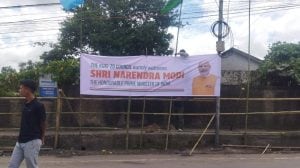Doctor can’t afford fees, shoes for son
Medical Officer, Maner Primary Health Centre Not paid for: two months Salary: Rs 11,000 Surviving ...

| BIHAR’S BLOODLESS M U R D E R |
It’s a father’s nightmare. And Shiv Narain Singh, a doctor by profession and a medical officer at the Maner Primary Health Centre, never thought he would see it. That one day, when his son got through college, he would have to borrow to pay the fees. And that when he asked for a pair of shoes, he would have to refuse, saying they were too expensive.
When Singh’s two children — son Saptashwa, 20, and daughter Shobha, 23 — now tell him they don’t want to follow in his footsteps, he can understand. He had joined the Bihar Public Service Commission in 1986, and after 20 years of government service, gets Rs 11,000 every month. Make that every six months. Others are spent living on hope and money borrowed from relatives.
At the primary centre where he works, the 20-odd staff has not been paid for six months, and have decided to go on a long strike. The centre — with six beds — lacks basic medicines and even a freezer. During the rains, water seeps into all the rooms.
This year, after a wait of five months, Singh got three months’ pay in August. He has little hope of being paid again till October. Three years ago, he went through a period when he wasn’t paid his salary for four and a half years when he was posted at Akasi in Rohtas district. ‘‘We ended up selling our land and jewellery, it was humiliating,’’ the doctor says. After a protracted court case, he was finally given back dues. But his arrears are again piling, now amounting to Rs 50,000.
| Medical Officer, Maner Primary Health Centre Not paid for: two months Salary: Rs 11,000 Surviving members: Wife and two children |
|
| Dr Shiv Narain Singh | |
| Coping: Borrows money from relatives, friends. Stays with relatives. His boss: Patna Civil Surgeon S.K. Aman, who has not got paid for two months |
|
So when Saptashwa got through the prestigious Symbiosis College in Pune recently, Singh turned to a doctor friend for Rs 10,000 to pay his fees. His daughter is a student of Patna Women’s College. ‘‘I sold my wife’s jewellery, but I have lost the cash memo and I can’t even get it back for her,’’ Singh says.
‘‘There are days when my own relatives humiliate me. Every day we face this humiliation. I’m not able to pay the electricity, water bills or tuition fees on time. On festivals, I can’t buy my children or wife new clothes.’’
But forget festivals, when Saptashwa recently asked his father for shoes, Singh had to again refuse. ‘‘He asked me if I had got paid and if I could get him a pair of shoes. But they are so expensive, I told him to wait.’’
Government doctors are allowed to run a private practice after work hours in the state, but in a small town, customers are hard to come by. As Singh points out, ‘‘If I sit in private practice, not even three patients will come. They get treated for free by me during working hours, why will they come to my private clinic?’’
Singh’s wife Manjula too keeps pleading with him to leave all this and go private. But fear is set deep in Singh’s heart now. ‘‘If the private practice doesn’t flourish, what will I do?’’ he asks.
Rajender Prasad Gupta is a special cholera worker at Singh’s centre, and he hasn’t been paid for five months. If his parents ever dreamed their son would support them one day, it has come true, in reverse. Every month, Gupta goes to his parents’ village and brings grains for a month to feed his family of five.
Ram Bali Yadav, a peon at the centre, is in the same boat. He hasn’t got his salary for three months, and all his four children have dropped out of school.
Higher up on the hierarchy, the story doesn’t change. Patna Civil Surgeon, and Singh’s boss, S.K. Aman is owed two months’ salary. ‘‘It is very difficult to manage when we are all dependent on our salaries. There is a big problem in the system,’’ he says.
The doctors’ salary comes through a system of allotment. The doctors are divided into those who work in hospitals and those who work on schemes. The funds for the schemes come from the Central Government and the problem begins when allotments are released late.
At neighbouring Sheikhpura Referral Hospital, Ayurvedic Medical Officer S.K. Pandey got his pay after a year recently. But worry about the future continues to haunt him.
‘‘My wife Shobha suffers from tension and stress, she doesn’t know how we will run the house. My son wants a computer, how do I tell my child I can’t afford a computer? My son is being deprived of so many things, but what can I do?’’ he says. ‘‘We are all victims.’’
Photos



- 01
- 02
- 03
- 04
- 05




























